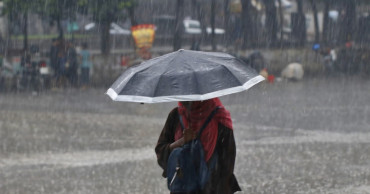Dhaka's air quality today
Dhaka ranks 3rd worst in air quality index this morning
Dhaka ranked as the third most polluted city in the world with ‘very unhealthy’ air quality on Friday morning.
Dhaka’s air quality index (AQI) score was 207 at 9:50 am today.
An AQI between 201 and 300 is said to be ‘very unhealthy’, while a reading of 301 to 400 is considered 'hazardous', posing serious health risks to residents.
Pakistan’s Lahore and Mongolia’s Ulaanbaatar occupied the first and second spots in the list, with AQI scores of 422 and 251, respectively.
Read more: No improvement in Dhaka’s air quality, still ‘unhealthy’
An AQI between 101 and 200 is considered 'unhealthy', particularly for sensitive groups.
In Bangladesh, the AQI is based on five criteria pollutants -- Particulate Matter (PM10 and PM2.5), NO2, CO, SO2 and Ozone.
Dhaka has long been grappling with air pollution issues. Its air quality usually turns unhealthy in winter and improves during the monsoon.
Air pollution consistently ranks among the top risk factors for death and disability worldwide. Breathing polluted air has long been recognised as increasing a person’s chances of developing a heart disease, chronic respiratory diseases, lung infections and cancer, according to several studies.
Read more: Dhaka's air quality remains 'unhealthy' Dhaka's air quality remains 'unhealthy'
As per the World Health Organization (WHO), air pollution kills an estimated seven million people worldwide every year, largely as a result of increased mortality from stroke, heart disease, chronic obstructive pulmonary disease, lung cancer and acute respiratory infections.
The worsening air quality of Dhaka city is threatening the health status and life of its residents.
3 years ago
Air Quality Index: Dhaka ranks 4th worst again this morning
Dhaka's air quality continued to remain in the 'unhealthy' zone on Friday morning.
With an air quality index (AQI) score of 184 at 9 am today, Dhaka ranked fourth again in the list of cities around the world with the worst air quality after Thursday.
An AQI between 101 and 200 is considered 'unhealthy', particularly for sensitive groups.
Pakistan’s Lahore, India’s Delhi and Pakistan’s Karachi occupied the first three spots in the list, with AQI scores of 353, 217 and 185, respectively.
Read more: Dhaka’s air 4th most polluted in the world this morning
An AQI between 201 and 300 is said to be 'poor', while a reading of 301 to 400 is considered 'hazardous', posing serious health risks to residents.
In Bangladesh, the AQI score is based on five kinds of pollutants — particulate matter (PM10 and PM2.5), NO2, CO, SO2 and Ozone.
Dhaka has long been grappling with air pollution issues. Its air quality usually turns unhealthy in winter and improves during the monsoon.
Read more: Dhaka ranks 5th worst in Air Quality Index
Air pollution consistently ranks among the top risk factors for death and disability worldwide. Breathing polluted air has long been recognised as increasing a person’s chances of developing a heart disease, chronic respiratory diseases, lung infections and cancer, according to several studies.
As per the World Health Organization (WHO), air pollution kills an estimated seven million people worldwide every year, largely as a result of increased mortality from stroke, heart disease, chronic obstructive pulmonary disease, lung cancer and acute respiratory infections.
3 years ago
Dhaka's air quality turns 'moderate' again
Dhaka is no longer the world's most polluted city -- it's air quality has turned ‘moderate’ again.
With an air quality index (AQI) score of 74 at 9am, the metropolis on Friday ranked 23rd in the list of world cities with the worst air quality.
An AQI between 50 and 100 is considered ‘moderate’ with an acceptable air quality. However, there may be a moderate health concern for a very small number of people who are unusually sensitive to air pollution.
Also read: Dhaka's air quality remains 'moderate'
South Africa’s Johannesburg, China’s Wuhan and Pakistan’s Lahore occupied the first three spots in the list, with AQI scores of 163, 155 and 139, respectively.
An AQI between 101 and 200 is considered 'unhealthy', particularly for sensitive groups.
Similarly, an AQI between 201 and 300 is said to be 'poor', while a reading of 301 to 400 is considered 'hazardous', posing serious health risks to residents.
In Bangladesh, the AQI is based on five criteria pollutants -- Particulate Matter (PM10 and PM2.5), NO2, CO, SO2 and Ozone.
Dhaka has long been grappling with air pollution issues. Its air quality usually turns unhealthy in winter and improves during the monsoon.
Air pollution consistently ranks among the top risk factors for death and disability worldwide. Breathing polluted air has long been recognised as increasing a person’s chances of developing a heart disease, chronic respiratory diseases, lung infections and cancer, according to several studies.
Also read: Dhaka's air quality 'moderate' this morning
As per the World Health Organization (WHO), air pollution kills an estimated seven million people worldwide every year, largely as a result of increased mortality from stroke, heart disease, chronic obstructive pulmonary disease, lung cancer and acute respiratory infections.
3 years ago
Drizzle fails to clean Dhaka's air
Dhaka's air quality continued to remain 'unhealthy for sensitive groups' on Tuesday despite intermittent late monsoon drizzle a day before.
With an air quality index (AQI) score of 132 at 9am, the metropolis ranked 9th in the list of world cities with the worst air quality.
The United Arab Emirates’ Dubai, Pakistan’s Lahore and Karachi occupied the first three spots, with AQI scores of 196, 196 and 154, respectively.
An AQI between 101 and 200 is considered 'unhealthy', particularly for sensitive groups.
Similarly, an AQI between 201 and 300 is said to be 'poor', while a reading of 301 to 400 is considered 'hazardous', posing serious health risks to residents.
Also read: Dhaka’s air turns ‘unhealthy for sensitive groups’
AQI, an index for reporting daily air quality, is used by government agencies to inform people how clean or polluted the air of a certain city is, and what associated health effects might be a concern for them.
In Bangladesh, the AQI is based on five criteria pollutants -- Particulate Matter (PM10 and PM2.5), NO2, CO, SO2 and Ozone.
Dhaka has long been grappling with air pollution issues. Its air quality usually turns unhealthy in winter and improves during the monsoon.
With the advent of winter, the city’s air quality starts deteriorating sharply due to the massive discharge of pollutant particles from construction work, rundown roads, brick kilns and other sources.
Air pollution consistently ranks among the top risk factors for death and disability worldwide. Breathing polluted air has long been recognised as increasing a person’s chances of developing a heart disease, chronic respiratory diseases, lung infections and cancer, according to several studies.
Also read: Dhaka’s air quality turns ‘moderate’
As per the World Health Organization (WHO), air pollution kills an estimated seven million people worldwide every year, largely as a result of increased mortality from stroke, heart disease, chronic obstructive pulmonary disease, lung cancer and acute respiratory infections.
3 years ago
Dhaka's air quality improves
Dhaka's air quality has improved to ‘moderate’ level.
With an air quality index (AQI) score of 81 at 9.22 am, the metropolis ranked 17th on the list of world cities with the worst air quality.
Iran’s Tehran, the UAE’s Dubai, and South Africa’s Johannesburg occupied the first three spots, with AQI scores of 161, 154, and 149, respectively.
On Thursday, the city’s air quality was marked ‘unhealthy’ with an AQI score of 121 at 9am.
Also read: Dhaka's air is 'unhealthy'
An AQI between 101 and 200 is considered 'unhealthy', particularly for sensitive groups.
Similarly, an AQI between 201 and 300 is said to be 'poor', while a reading of 301 to 400 is considered 'hazardous', posing serious health risks to residents.
AQI, an index for reporting daily air quality, is used by government agencies to inform people how clean or polluted the air of a certain city is, and what associated health effects might be a concern for them.
In Bangladesh, the AQI is based on five criteria pollutants -- Particulate Matter (PM10 and PM2.5), NO2, CO, SO2 and Ozone.
Dhaka has long been grappling with air pollution issues. Its air quality usually turns unhealthy in winter and improves during the monsoon.
A report by the Department of Environment (DoE) and the World Bank in March 2019 pointed out that the three main sources of air pollution in Dhaka "are brick kilns, fumes from vehicles and dust from construction sites".
With the advent of winter, the city’s air quality starts deteriorating sharply due to the massive discharge of pollutant particles from construction work, rundown roads, brick kilns and other sources.
Also read: Dhaka air quality turns ‘moderate’
Air pollution consistently ranks among the top risk factors for death and disability worldwide. Breathing polluted air has long been recognised as increasing a person’s chances of developing heart disease, chronic respiratory diseases, lung infections and cancer, according to several studies.
As per the World Health Organization (WHO), air pollution kills an estimated seven million people worldwide every year, largely as a result of increased mortality from stroke, heart disease, chronic obstructive pulmonary disease, lung cancer and acute respiratory infections.
3 years ago









